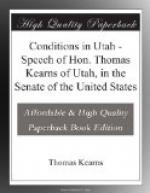In all this there is no thought on my part of opposition to voluntary gifts by individuals for religious purposes or matters connected legitimately with religion. My comment and criticism are against the tyranny which misuses a sacred name to extract from individuals the moneys which they ought not to spare from family needs, and which they do not wish to spare; my comment and criticism relate to the power of a monarch whose tyranny is so effective as that not even the moneys paid by the Government are considered the property of the Government’s servant until after this monarch shall have seized his arbitrary tribute, with or without the willing assent of the victim, so that the monarch may engage the more extensively in commercial affairs, which are not a part of either religion or charity.
With an income of 5 per cent upon one-quarter of the entire assessed valuation of the State of Utah to-day, how long will it take this monarch, with his constantly increasing demands for revenue, to so absorb the productive power that he shall be receiving an income of 5 per cent upon one-half the property, and then upon all of the property of the State? This is worse than the farming of taxes under the old French Kings. Will Congress allow this awful calamity to continue?
The view which the people of the United States entertained on this subject forty years ago was shown by the act of Congress in 1802, in which a provision, directed particularly against the Mormon Church, declared that no church in a Territory of the United States should have in excess of $50,000 of wealth outside of the property used for purposes of worship. It is evident that as early as that time the pernicious effects of a system which used the name of God and the authority of religion to dominate in commerce and finance were fully recognized.
This immense tithing fund is gathered directly from Mormons, but the burden falls in some degree upon Gentiles also. Gentiles are in business and suffer by competition with tithe-supported business enterprises. Gentiles are large employers of Mormon labor; and as that labor must pay one-tenth of its earnings to support competitive concerns, the Gentile employer must pay, indirectly at least, the tithe which may be utilized to compete with, and even ruin, him in business.
And in return it should be noted that Mormon institutions do not employ Gentiles except in rare cases of necessity. The reason is obvious: Gentiles do not take as kindly to the tithing system as do the Mormons.
The Mormon citizen of Utah has additional disadvantages. After paying one-tenth of all his earnings as a tithe offering, he is called upon to erect and maintain the meetinghouses and other edifices of the church; he is called upon to donate to the poor fund in his ward, through his local bishop; he is called upon to sustain the Women’s Relief Society, whose purpose is to care for the poor and to minister to




